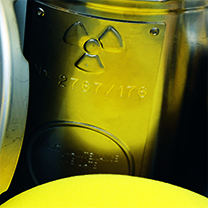-
National Policy, Strategy and Framework for Radioactive Waste Management
P&S• National framework, policy and strategy
• Role & Responsibilities of the different interested parties in the different steps of radioactive waste management (e.g. regulator, operator, civil society, etc.)
• Confidence building in decision making process and science and technology
• Interactions/relations between Regulator and Operator during the pre-licensing process & licensing process
• National approaches for building competences for radioactive waste management (incl. HR component, Knowledge transfer)
• Role of International Cooperation for national RWM programmes:
International collaborative R&D;
International guidance and legal instruments;
Roles and timing of Peer Reviews
• National approaches for the handling of radiological and non-radiological requirements
• Interface of safety, security and safeguards within radioactive waste management
• Funding mechanisms for radioactive waste management programmes -
Predisposal (Waste processing)
WPr• Good practices – minimization; segregation; characterization; classification; conditioning, etc.
• Innovative technologies – conditioning, characterisation, etc.
• Clearance levels and application of clearance levels
• Challenges in management of legacy and special wastes (e.g. Graphite, Beryllium), and mixed hazard waste
• Approaches and solutions for treatment and conditioning without a defined end-point – options and interdependences of different waste management steps to be considered
• Regulatory approach for pre-disposal oversight: requirements, compliance control, review and assessment, inspections, enforcement actions -
Predisposal (Storage of Radioactive Waste and Spent Nuclear Fuel)
STO• Developing the safety case for storage
• Examples of good practice, including monitoring, inspection, knowledge management, etc.
• Regulatory aspects: expectations for demonstration of safety; inspections; decisions and actions upon non-compliance
• Challenges when storage time extended longer than planned: waste form evolution/degradation; relicensing; ageing management; regulatory considerations for storage time extensions
• Technological and safety aspects of multi-purpose casks (storage/transport/disposal) -
Disposal of Very Low Level Waste and Low Level Waste
V&LLW• Developing the safety case for VLLW and LLW disposal
• Specific safety aspects and technological solutions for disposal of VLLW and LLW containing long-lived radionuclides e.g. uranium, radium bearing waste, etc.
• Regulatory aspects: expectations for demonstration of safety; inspections; decisions and actions upon non-compliance
• Monitoring and institutional control
• Consideration of human intrusion in the safety case
• The site selection process and screening criteria
• Challenges of adapting overseas concepts and designing for local conditions
• Lessons learned from operation of facilities
• Approaches to manage existing facilities which do not comply with current safety standards (e.g. historical facilities)
• Experience with use of International guidance -
Disposal of Intermediate Level Waste
ILW• Developing the safety case for ILW disposal
• Specific safety aspects and technological solutions for disposal of ILW (e.g. gas generation, optimization of depth of disposal, timeframes for safety assessment, long-lived radionuclides)
• Regulatory aspects: expectations for demonstration of safety; inspections; decisions and actions upon non-compliance
• Monitoring and institutional control
• Consideration of human intrusion in the safety case
• The site selection process and screening criteria
• Challenges of adapting overseas concepts and designing for local conditions
• Lessons learned from operation of facilities
• Experience with use of International guidance -
Disposal of Disused Sealed Radioactive Sources
DSRS• Developing the safety case for the disposal of DSRS
• Specific safety aspects and technological solutions for the disposal of DSRS
• Regulatory aspects: expectations for demonstration of safety; inspections; decisions and actions upon non-compliance
• Dedicated disposal solution and challenges in their implementation -
Disposal of High Level Waste, Including Spent Nuclear Fuel Declared as Waste
HLWSF• Experience in developing and reviewing safety cases for the disposal of high level radioactive waste (operational and long-term safety)
• Experience from siting process including the role of and interactions between the different interested parties (implementer, regulator, government, public, etc.)
• Specific safety aspects and technological solutions for disposal of HLW (e.g. monitoring and role to support decision making, reversibility/retrievability, scenario development, knowledge management and memory keeping, etc.)
• Flexibility of geological disposal facilities to accommodate evolution of inventories and characteristics of waste
• Experience and challenges for operators and regulators in moving from development to the construction and operation of the disposal facility (industrialization, regulatory authorization, etc.)
• Using the safety case for prioritization of research and development
• Challenges for Member States contemplating shared disposal facilities (e.g. responsibilities, decision-making, public involvement and acceptance, etc.)
• Experience with use of International guidance -
Post-Accident Waste Management: Lessons Learned and Preparedness
PAWM• Experience of post-accident waste management (e.g. management of large amounts of waste (generally low activity) or damaged fuel, characterization of waste, etc.) including:
Strategies for identifying and developing storage sites, conditioning techniques, and disposal concepts;
Establishment of radiological protection criteria for post-accident conditions.
• Lessons learned – Member States’ planning for post-accident waste management and necessary organisational and regulatory framework, including:
Scenarios to consider for evaluating and selecting appropriate waste management strategies
• Licensing process for post-accident waste management activities and facilities
• Public involvement e.g. in preparation and implementation of post-accident waste management strategies
Choose timezone
Your profile timezone:

